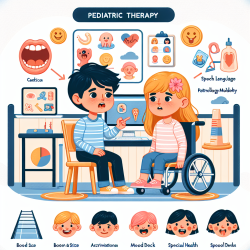Introduction
Pompe disease, a rare genetic disorder, poses unique challenges in the behavioral, social, and school functioning of affected children. A recent study published in Molecular Genetics and Metabolism Reports provides valuable insights into these areas, offering practitioners a data-driven approach to improving outcomes for children with this condition.
Understanding Pompe Disease
Pompe disease is caused by a deficiency in the enzyme acid alpha-glucosidase, leading to glycogen accumulation in muscles and the nervous system. It is classified into infantile Pompe disease (IPD) and late-onset Pompe disease (LOPD), with varying severity and clinical outcomes. Enzyme replacement therapy (ERT) has significantly improved survival rates, but long-term effects on behavioral and social functioning remain a concern.
Key Findings from the Study
The study involved 21 children aged 5-18 years with Pompe disease, using standardized behavior checklists like the Child Behavior Checklist (CBCL), Conners 3 Parent (Conners-3), and Behavior Rating Inventory of Executive Function-2 (BRIEF2). The results highlighted several important findings:
- Most children exhibited age-appropriate behavior and emotional functioning.
- Negative mood symptoms, learning problems, and attentional difficulties were more common in children with IPD.
- Children with LOPD showed fewer problematic behaviors but had issues with mood and peer relations.
- Most children received accommodations in regular education classrooms.
Implications for Practitioners
Practitioners can leverage these findings to enhance their therapeutic approaches:
- Early Identification: Use standardized behavior checklists as screening tools to identify potential behavioral and emotional issues early, allowing for timely intervention.
- Multidisciplinary Approach: Collaborate with educators, psychologists, and other healthcare providers to create comprehensive care plans addressing both medical and educational needs.
- Focus on Emotional and Social Skills: Implement strategies to support emotional regulation and social participation, particularly for children with IPD who may struggle in these areas.
- Accommodations in Education: Advocate for appropriate school accommodations and support services, such as Individualized Education Programs (IEPs) or 504 Plans, to ensure academic success.
Encouraging Further Research
While this study provides a foundational understanding, further research is needed to explore the long-term behavioral and social outcomes in children with Pompe disease. Practitioners are encouraged to contribute to this growing body of knowledge by conducting longitudinal studies and sharing findings with the broader medical community.
Conclusion
By integrating the insights from this study into their practice, speech-language pathologists and other practitioners can better support children with Pompe disease in achieving optimal behavioral, social, and educational outcomes. For those interested in delving deeper into the research, the original study can be accessed here.










